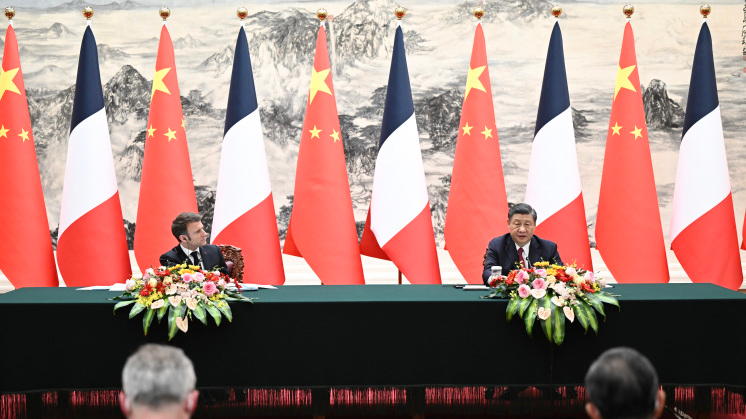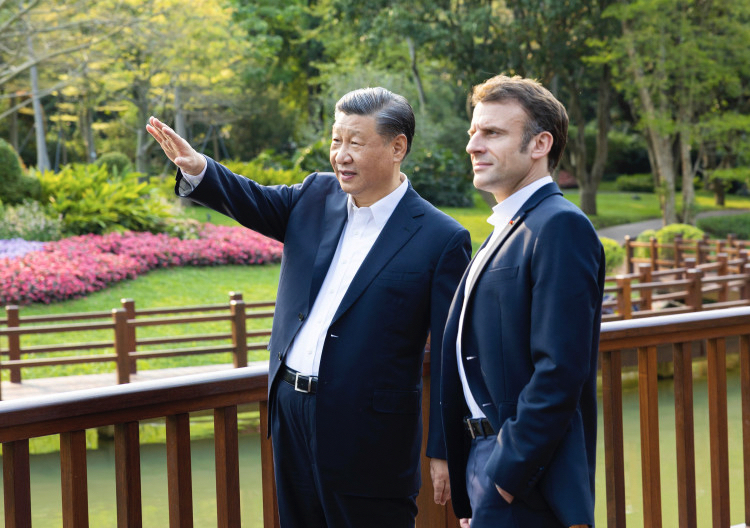
Chinese President Xi Jinping and French President Emmanuel Macron jointly meet the Chinese and foreign press after their talks at the Great Hall of the People in Beijing, capital of China, April 6, 2023. /Xinhua
Chinese President Xi Jinping and French President Emmanuel Macron jointly meet the Chinese and foreign press after their talks at the Great Hall of the People in Beijing, capital of China, April 6, 2023. /Xinhua
Editor's note: Wang Shuo is a professor at the School of International Relations, Beijing Foreign Studies University. The article reflects the author's opinions and not necessarily the views of CGTN.
On April 5, French President Macron paid a three-day state visit to China, marking his first visit since the outbreak of COVID-19. According to a joint statement issued by the two countries on April 7, China and France vowed to strengthen political dialogue and promote mutual political trust. It seems that China-France relations are ushering in a warm spring. In the post-pandemic era, both China and France are trying to think about what kind of relationship to establish in order to better serve each other's interests.
China-France relations should be based on history and look forward to the future. France was the first Western power to establish diplomatic relations with the People's Republic of China. This relationship was of great significance to both China and France at that time. There are similarities in the diplomatic concepts between China and France. As an advocate of European strategic autonomy, President Macron hopes to choose relations with the external world based on their own interests, and actively advocate and promote multilateralism.
On the other hand, both Chinese and French leaders attach great importance to bilateral relations. Macron has stated that he hopes to visit China every year if possible, and with the resumption of cultural exchanges between the two sides after the epidemic, he also chooses to visit as soon as possible.
China-France relations should go beyond bilateral level. France is not only a core member of the European Union (EU), but also has influence in the world beyond its own strength. China is also the largest developing country in the world, and the two countries are permanent members of the UN Security Council. Therefore, China-France relations inevitably go beyond bilateral level, involving Europe and many more countries of the world. In particular, President Macron is always committed to reviving France, actively promoting European integration, and striving to revive France's status as a major power through Europe.
President Macron's visit to China, together with the President of the European Commission Ursula von der Leyen, undoubtedly adds European colors to China-France relations. Especially with the complicated Ukraine crisis, Macron values China's ability in international affairs and urgently needs China to play a positive role in promoting ceasefire and peace rebuilding. This is also one of the most important topics of his visit and adds a global relevance to China-France relations. As Macron said, "I firmly believe that China plays a crucial role in building peace."

Chinese President Xi Jinping and French President Emmanuel Macron stroll through the Pine Garden, chatting and stopping at times to enjoy the unique scenery of the southern Chinese garden, in Guangzhou, south China's Guangdong Province, April 7, 2023. /Xinhua
Chinese President Xi Jinping and French President Emmanuel Macron stroll through the Pine Garden, chatting and stopping at times to enjoy the unique scenery of the southern Chinese garden, in Guangzhou, south China's Guangdong Province, April 7, 2023. /Xinhua
China-France relations should be based on practical cooperation. Currently, globalization is facing challenges. Free trade is hindered, and protectionism and populism are on the rise. France and Europe as a whole are deeply affected by the crisis, while China also needs to improve the quality of development. Both China and France, and China and the EU have practical needs to strengthen practical cooperation. Macron stated on his Twitter that "I am convinced that China has a major role to play in building peace. This is what I have come to discuss, to move forward on."
Meanwhile, China and France already have good political relations, which provides a guarantee for practical cooperation. There is great potential for cooperation in traditional large-scale projects such as aerospace and civil nuclear energy, as well as in the field of new energy. This in turn further enhances political mutual trust, forms a virtuous cycle, and establishes a more stable and sustainable China-French relationship.
China-France relations should properly handle differences. China and France are at different stages of development, with different historical and cultural backgrounds and values, therefore it is natural for them to have differences. The key is not how many differences we have, but how to handle them well. Europe defines China as a cooperative partner, technological competitor, and "systemic rival." Although this three-level definition has some limitations, it is undeniable that Europe still defines China firstly as a partner. Cooperation between China and France outweighs differences, so we must prioritize cooperation and properly handle frictions between the two sides.
In 2024, China and France will celebrate the 60th anniversary of the establishment of diplomatic relations. This is a summary of cooperation and a new starting point for the future. And the joint statement will add a new chapter for cooperation between China and France. As long as China and France can truly start from their practical interests and strive to build a stable and lasting framework of mutual trust, their cooperation is worth looking forward to, and will inevitably become the cornerstone of China-EU relations.
(If you want to contribute and have specific expertise, please contact us at opinions@cgtn.com. Follow @thouse_opinions on Twitter to discover the latest commentaries in the CGTN Opinion Section.)